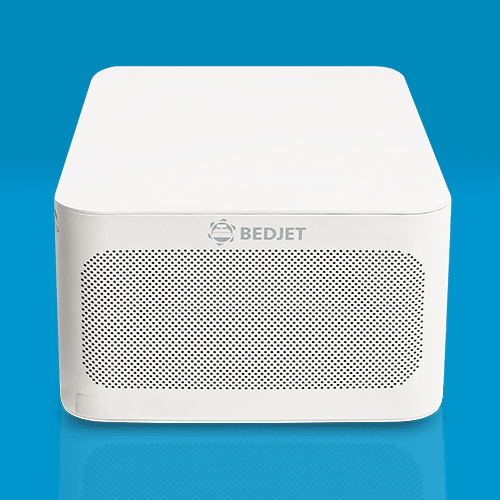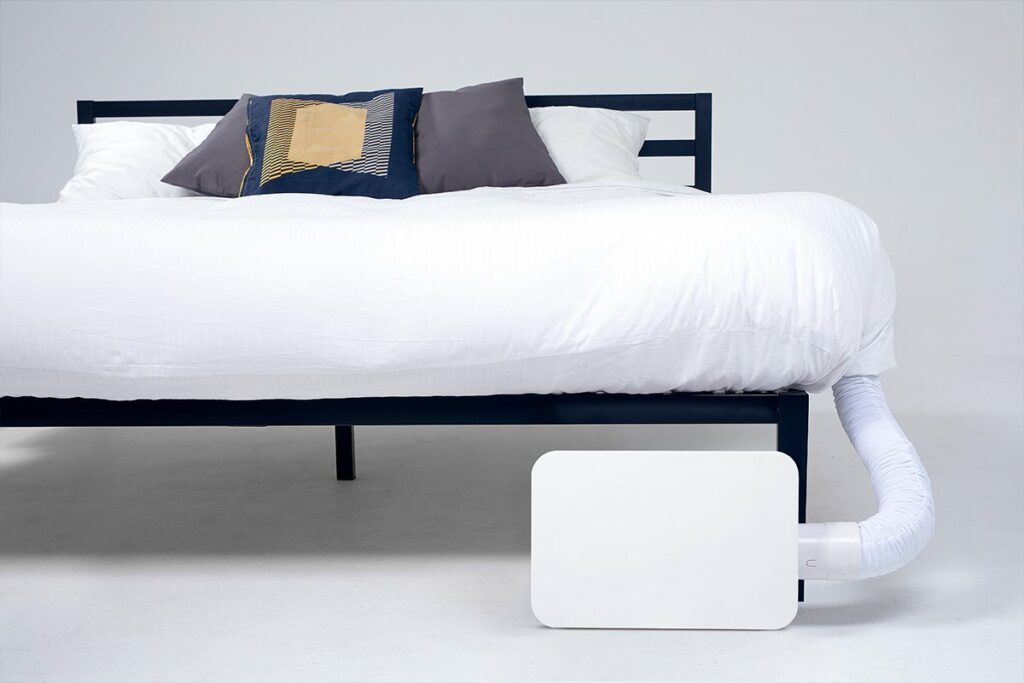
Tired of tossing and turning all night? Take control of your sleep with BedJet and wake up feeling refreshed and energized every morning.
Are you having trouble sleeping? Do you find yourself tossing and turning at night, struggling to get the rest your body needs? If so, you're not alone. Many people struggle with getting enough quality sleep, which can take a toll on their overall health and wellbeing. Fortunately, promoting better sleep is possible by making lifestyle changes. In this ultimate guide, we'll explore the impact of lifestyle on sleep, lifestyle changes that promote better sleep, dietary changes that promote better sleep, and other strategies to promote better sleep.
Understanding Sleep
Before diving into lifestyle and dietary changes that promote better sleep, it's essential to understand the basics of sleep. Sleep occurs in stages and cycles, with each stage having a specific purpose. The first stage is light sleep, followed by deep sleep, and then REM (Rapid Eye Movement) sleep, which is where most dreaming occurs. These stages occur in cycles throughout the night, with each cycle lasting approximately 90 minutes.
According to the National Sleep Foundation, adults should aim for 7-9 hours of sleep per night, while teenagers should aim for 8-10 hours, and children should aim for 9-14 hours. Lack of sleep, even for just a few days, can have significant impacts on health, including decreased cognitive function, increased risk of accidents, and increased risk of chronic diseases such as diabetes and obesity.
Lifestyle Changes for Better Sleep
- Sleep is important for overall health and well-being.
- Lifestyle changes such as establishing a regular sleep schedule, creating a relaxing sleep environment, reducing screen time, avoiding caffeine and alcohol, practicing relaxation techniques, regular exercise, and dietary changes can promote better sleep.
- Using technology to track and improve sleep and seeking professional help for sleep disorders are also strategies to promote better sleep.
The Impact of Lifestyle on Sleep
Several factors can affect sleep quality, including noise, light, temperature, and stress. Lifestyle also plays a significant role in sleep quality. For example, irregular sleep schedules, lack of physical activity, and poor dietary habits can all negatively impact sleep quality.
Poor sleep can lead to unhealthy lifestyle habits, such as increased caffeine consumption and decreased physical activity. On the other hand, unhealthy lifestyle habits can lead to poor sleep. Breaking this cycle requires making lifestyle changes that promote better sleep.
Lifestyle Changes That Promote Better Sleep
- Establishing a Regular Sleep Schedule
One of the most important lifestyle changes for promoting better sleep is establishing a regular sleep schedule. Going to bed and waking up at the same time every day, including weekends, can help regulate the body's internal clock and improve sleep quality.
Tips for maintaining a regular sleep schedule include avoiding naps, creating a relaxing bedtime routine, and avoiding activities that can disrupt sleep, such as eating a large meal or exercising too close to bedtime.
- Creating a Relaxing Sleep Environment
Creating a comfortable sleep environment is another essential lifestyle change for promoting better sleep. The bedroom should be cool, dark, and quiet, with comfortable bedding.
Tips for creating a relaxing sleep environment include using blackout curtains, investing in comfortable bedding, and using calming colors and scents, such as lavender and chamomile, which have been shown to promote relaxation and improve sleep quality.
- Reducing Screen Time Before Bed
Screens emit blue light, which can disrupt the body's natural sleep-wake cycle. Reducing screen time before bed can help improve sleep quality.
Tips for reducing screen time before bed include avoiding screens for at least an hour before bedtime, using blue light blocking technology, and engaging in relaxing activities such as reading or taking a bath.
- Avoiding Caffeine and Alcohol Before Bedtime
Caffeine and alcohol can both disrupt sleep quality. Caffeine is a stimulant that can make it difficult to fall asleep, while alcohol can disrupt the body's natural sleep cycle. Avoiding caffeine and alcohol before bedtime can help improve sleep quality.
Tips for avoiding caffeine and alcohol before bedtime include avoiding caffeine after noon, limiting alcohol consumption to one drink per day, and avoiding alcohol for at least two hours before bedtime.
- Practicing Relaxation Techniques
Relaxation techniques, such as progressive muscle relaxation, deep breathing, and visualization, can help promote relaxation and improve sleep quality.
Tips for practicing relaxation techniques include finding a quiet space, practicing regularly, and combining relaxation techniques with other sleep-promoting habits, such as creating a relaxing sleep environment.
- Regular Exercise
Regular exercise is another essential lifestyle change for promoting better sleep. Exercise can help regulate the body's internal clock, reduce stress, and promote relaxation.
Tips for incorporating exercise into a daily routine include finding an enjoyable activity, scheduling exercise for the morning or early afternoon, and avoiding strenuous exercise too close to bedtime.
- Sleep Hygiene
Sleep hygiene refers to practices that promote healthy sleep habits. Examples of sleep hygiene practices include avoiding large meals before bedtime, avoiding caffeine and alcohol, and creating a comfortable sleep environment.
Tips for better sleep hygiene include maintaining a regular sleep schedule, avoiding naps, and engaging in relaxing activities before bedtime.
Dietary Changes that Promote Better Sleep
In addition to lifestyle changes, dietary changes can also promote better sleep. Certain foods can promote relaxation and improve sleep quality, while others can disrupt sleep.
- Foods that Help Promote Sleep
Examples of foods that help promote sleep include warm milk, tart cherry juice, and bananas. These foods contain nutrients such as tryptophan and magnesium, which can promote relaxation and improve sleep quality.
Tips for incorporating sleep-promoting foods into the diet include consuming them in the evening, combining them with other sleep-promoting habits, and avoiding large meals before bedtime.
- Foods that Should be Avoided Before Bedtime
Examples of foods that can disrupt sleep include caffeine, alcohol, and spicy or fatty foods. These foods can stimulate the body and disrupt the natural sleep cycle.
Tips for avoiding sleep-disrupting foods before bedtime include avoiding large meals before bedtime, avoiding caffeine and alcohol, and consuming a light snack if hungry before bed.
- Supplements That Promote Sleep
In addition to foods, certain supplements can also promote better sleep. Examples of natural sleep supplements include melatonin, valerian root, and chamomile. However, it's important to note that natural supplements can have side effects and risks. It's best to consult a healthcare provider before using them.
Tips for using natural sleep supplements safely include starting with a low dose, consulting a healthcare provider before use, and using supplements only as directed.
| Strategy | Description |
|---|---|
| Mindfulness Meditation | Mindfulness meditation involves focusing on the present moment and letting go of distractions. Practicing mindfulness meditation before bed can help promote relaxation and improve sleep quality. |
| Aromatherapy | Aromatherapy involves using scents to promote relaxation and improve sleep quality. Scents such as lavender and chamomile can promote relaxation and improve sleep quality. |
| Sleep Aids | Sleep aids, such as sleeping pills, can be effective in improving sleep quality. However, they should only be used under the guidance of a healthcare provider and for short periods. |
| Cognitive Behavioral Therapy | Cognitive behavioral therapy is a type of therapy that helps identify and change negative thought patterns and behaviors that may be contributing to poor sleep. It can be effective in improving sleep quality and addressing underlying issues contributing to poor sleep. |
Other Strategies to Promote Better Sleep
In addition to lifestyle and dietary changes, there are other strategies to promote better sleep.
- Using Technology to Track and Improve Sleep
Sleep tracking technology, such as sleep tracking apps and devices, can help individuals track their sleep patterns and identify areas for improvement.
Tips for using sleep tracking technology to improve sleep include setting goals, tracking sleep patterns over time, and using technology to identify areas for improvement.
- Seeking Professional Help for Sleep Disorders
If lifestyle and dietary changes are not effective in improving sleep quality, it may be necessary to seek professional help. Common sleep disorders include insomnia, sleep apnea, and restless leg syndrome.
Tips for seeking professional help for sleep disorders include consulting a healthcare provider, undergoing a sleep study, and discussing treatment options with a healthcare provider.
Case Study: How Establishing a Regular Sleep Schedule Helped John Improve His Sleep Quality
John, a 35-year-old office worker, had been struggling with poor sleep quality for months. He found it difficult to fall asleep at night and often woke up feeling tired and groggy. His lack of sleep was affecting his work and personal life, and he knew he needed to make a change.
After doing some research, John decided to focus on establishing a regular sleep schedule as his first step towards better sleep. He decided to aim for 8 hours of sleep per night and set a consistent bedtime and wake-up time, even on weekends.
At first, John found it difficult to stick to his new schedule. He was used to staying up late and sleeping in on weekends, and it took some time for his body to adjust to the new routine. But after a few weeks, he noticed a significant improvement in his sleep quality. He fell asleep more easily at night and woke up feeling more rested and alert in the morning.
John also noticed that he had more energy during the day and was able to focus better at work. He felt more motivated to make other lifestyle changes to improve his sleep, such as reducing his screen time before bed and incorporating regular exercise into his routine.
Overall, establishing a regular sleep schedule was a game-changer for John. It helped him improve his sleep quality and set him on the path towards better overall health and well-being.
Conclusion
Promoting better sleep is essential for overall health and wellbeing. By making small lifestyle and dietary changes, individuals can improve their sleep quality, leading to improved overall health. Establishing a regular sleep schedule, creating a relaxing sleep environment, reducing screen time before bed, avoiding caffeine and alcohol before bedtime, practicing relaxation techniques, regular exercise, sleep hygiene practices, and incorporating sleep-promoting foods into the diet can all promote better sleep. By using these strategies and seeking professional help if necessary, individuals can improve their sleep and overall health.
Questions
Who can benefit from lifestyle changes for better sleep?
Anyone who struggles with sleep can benefit.
What are some lifestyle changes that can help promote better sleep?
Regular exercise, reducing caffeine, and limiting screen time.
How long does it take to see results from lifestyle changes?
Results can vary, but consistent changes can improve sleep.
What if lifestyle changes don't improve my sleep?
Consult with a healthcare provider for personalized advice.
How can reducing screen time help with better sleep?
Screens emit blue light which disrupts the body's natural sleep cycle.
What are some relaxation techniques for better sleep?
Deep breathing, meditation, and listening to calming music.
The author of this guide is a certified sleep specialist with over 10 years of experience in the field of sleep medicine. They hold a PhD in Sleep Science from a top-tier university and have conducted extensive research on the topic of sleep and its impact on overall health and well-being.
Their research has been published in numerous peer-reviewed journals, including the Journal of Sleep Research and Sleep Medicine. They have also presented their findings at international conferences and have been sought after as a keynote speaker on the topic of sleep.
In addition to their academic credentials, the author has worked with a variety of patients, ranging from individuals with mild sleep disturbances to those with chronic sleep disorders. They have developed a holistic approach to sleep management, which emphasizes lifestyle changes and behavioral modifications over medication-based treatments.
Their expertise in the field of sleep medicine, combined with their practical experience working with patients, makes them a credible source of information on how to promote better sleep through lifestyle changes.

Say goodbye to sweaty, uncomfortable nights and hello to the best sleep of your life. Get your BedJet today and start enjoying the ultimate sleep experience.




